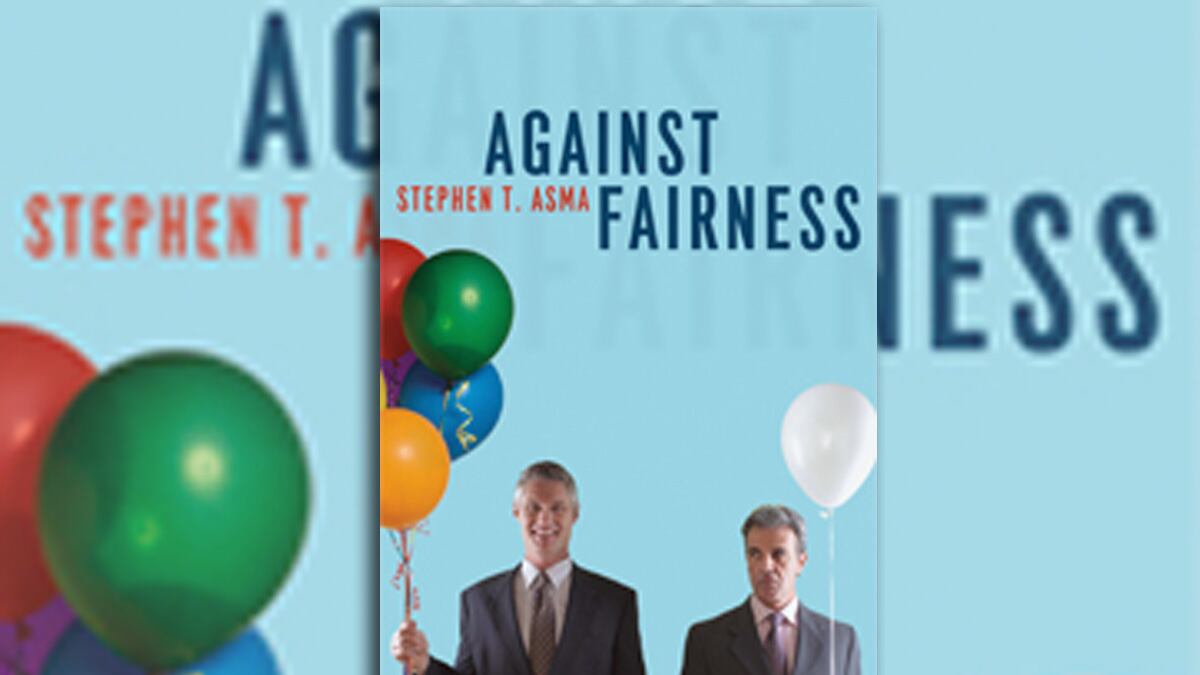
The Anglo-American poet W. H. Auden claimed that American ideology reverses the traditional European value system—for Europe, virtue precedes freedom, but for Americans freedom precedes virtue. Auden noticed that America is so fiercely devoted to liberty that we would rather freely choose vice than have virtue forced upon us. Our national stance—“You’re not the boss of me”—leads us to think of freedom as an end in itself rather than a means to some virtuous end. This may be one of the reasons why Americans tend to think of morality as a set of rules rather than as virtues or modes of character. American values assert freedom from harassment and freedom to fulfill basic human capabilities, but positive and substantial notions of good are noticeably absent beyond this rudimentary ethical conversation. I have been suggesting that many of the substantial ingredients of the good life (i.e., bonds of family, friends, and tribe) clash incurably with our official culture of fairness. I want to remind people about the virtues of favoritism. Let us turn to some recognizable ones: loyalty, generosity, and gratitude.
Loyalty
The American educator and psychologist Rensis Likert (1903–1981) argued that the real cause of group success was not top-down management but intergroup loyalty. “The greater the loyalty of a group toward the group, the greater is the motivation among the members to achieve the goals of the group, and the greater the probability that the group will achieve its goals.”8 This appears to be a general management application of an already well-known truth about successful families and tribes. If we have each other’s backs, then we survive and thrive. But the thing about loyalty is that it’s not premised on optimal conditions. You need to have my back, for example, even when I’m sometimes wrong. You need to have my back, even when I sometimes screw up the job. And I have to extend to you the same loyalty.
Having a shared cause (even an arbitrary one) is a monumental aspect of the meaningful life. For one thing, it sifts out many of our competing desires and focuses our motivations. Loyalty also sparks a related virtue—resoluteness. We resolve to stay the course, even when storms try to divert us. And shared cause is what “takes over” after the biology of family bonding does its first-tribe work, and we find ourselves out in the free realm of competing allegiances. The average child finds herself already allied with a given community, but as she matures she consciously gives loyalty to new shared causes—thereby bringing herself into meaningful community with others. Equality and fairness have little to offer in this fundamentally biased arena of meaning.
Loyalty and fairness seem to me to be two of the inherently clashing values that Isaiah Berlin warned us about. Of course, loyalty on its own will not be enough to set our ethical norms, and other considerations (regarding which goals we should be loyal to) will need to inform the virtue. But in a sense, the kind of loyalty I’m praising here is loyalty to specific people, not to “goals” or “causes.” The truly loyal person says: To hell with consequences! The egalitarian rule-follower is merely expedient, but the loyal person will go to the wall for you. And you’re supposed to return the existential devotion.
Generosity
Another crucial virtue of favoritism is generosity. Most people ally generosity on the side of fairness because fairness seeks to redistribute benefits and properties. But favoritists can claim selfless giving as a virtue too. Greed is not possible in a real circle of favorites, and the truly avaricious must separate themselves away from the bonds of family and friends in order to indulge their vice. Unlike the bureaucratic egalitarian attempt to distribute minimal goods as far and as widely as possible, the favoritist will lavish his loved ones with benefits that cost blood, sweat, and tears.
As Christian egalitarianism grew and appropriated the ancient virtues, the idea of generosity changed slightly from sharing as philia (brotherly love) to sharing as philanthropos (love of all humanity). The ancients had an idea of “loving all humanity,” but it was embryonic and applied more to how the gods loved the human race (e.g., Prometheus was philanthropic when he gave us fi re). Generosity, in the Christian era, became redefined as giving to the poor (whether we knew the poor or not).
The virtue of generosity that may best capture the biased version is probably magnanimity. This is the ancient virtue of being big-hearted (literally, the large-souled person). This is giving without any expectation of recompense. But when we read ancients, like Aristotle and Cicero, we find that affection is the inner spring of this generosity. Since I already discussed the virtue of “biased generosity” in chapter 4, I want to turn to the correlate virtue—namely, gratitude.
Gratitude
It’s hard for many of us to receive a gift. We do fine with birthday presents, wedding gifts, and other institutionalized generosities. But most other gifts come with strings attached, and Americans in particular are uncomfortable with the binding entanglements that strings bring.
If we’re raised on an ideology of self-reliance, and if our money-based economy has “freed” us from family dependence, then being grateful may not be a regular exercise for us.
In a real circle of favorites, however, one needs to accept help gracefully. We must accept, without cynicism, the fact that some of our family and friends give to us for our own sake (our own flourishing) and not for their eventual selfish gain. However animalistic were the evolutionary origins of giving (and however vigorous the furtive selfish genes), the human heart, neocortex, and culture have all united to eventually create true altruism. Gratitude is a necessary response in a sincere circle of favorites.
Pride is a curious thing because it puffs up whenever you know that you are someone’s favorite—whether you’re one of God’s chosen people, or you’ve just been chosen first for gym-class soccer team, or the cute girl chose you at the dance. But pride can also prevent you from graciously accepting help and can fill you with resentment instead of appreciation. This is not just a psychological generalization, but a kind of existential point. It takes real effort and sensitivity to accept preferential treatment. A sense of existential worth comes along with genuine gratitude. And a rare charity toward oneself (a kind of magnanimity) must accompany the thought: I’ll gladly accept your help, and (in some cases) I’ll never be able to pay you back. The idealized grid of fairness cannot limn the contours of these deep existential debts.
The Archbishop and the Chambermaid
The impulse to equality and fairness is thought to be our highest principle, but in many specific contexts it short-circuits, loses coherence, and even violates some of our deeper values. I’ve tried to rescue nepotism from corruption, affirm justice in the absence of fairness, and praise tribal devotion in a world of strangers.
My hope is that other thinkers will follow my lead and try to find ways to integrate preferentialism into Western liberalism, but also adopt enough realism to acknowledge the unfixable value clashes when they arise. Tribal values certainly dominated before the rise of liberalism, and now liberalism (as the grid of impartiality) has certainly had a few centuries in the sun. It’s time, I submit, for a new injection of some old-school favoritism.
One of the architects of modern utilitarian ethics was William Godwin (1756–1836), a philosopher who formulated a famous thought experiment and is an intellectual progenitor of contemporary ethicists like Peter Singer. He asked us to imagine if you could only save one person from a burning building. One of those persons is Archbishop Fénelon and the other is a common chambermaid. Furthermore, the archbishop is just about to compose his famous work The Adventures of Telemachus (an influential defense of human rights). Now, here’s the rub. The chambermaid is your mother.
Godwin argues that the utilitarian principle (i.e., the greatest good for the greatest number) requires you to save the archbishop rather than your mother. He asks, “What magic is there in the pronoun ‘my,’ that should justify us in overturning the decisions of impartial truth?”
What magic? No magic, I submit. But everything else of value lies contained in that little word “my.”
Reprinted with permission from Against Fairness by Stephen T. Asma, published by the University of Chicago Press. © 2012 The University of Chicago. All rights reserved.





